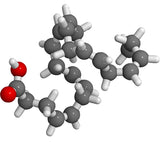The ABCs of EFAs
 EFA isn't another equestrian governing body, it stands for Essential Fatty Acids. These are the polyunsaturated 'good' fats that the body needs for various metabolic processes. They are called 'essential' because the body cannot produce them, they must be provided in the diet. The EFA we have all heard of is Omega3, but there is also Omega6. The difference between them lies in their chemical structure, and they have different effects when they are metabolised within the body. Omega6 is proinflammatory whilst Omega3 inhibits the production of proinflammatory mediators. This inhibitory effect of Omega3 on inflammation is what has human and equine scientists so interested.
EFA isn't another equestrian governing body, it stands for Essential Fatty Acids. These are the polyunsaturated 'good' fats that the body needs for various metabolic processes. They are called 'essential' because the body cannot produce them, they must be provided in the diet. The EFA we have all heard of is Omega3, but there is also Omega6. The difference between them lies in their chemical structure, and they have different effects when they are metabolised within the body. Omega6 is proinflammatory whilst Omega3 inhibits the production of proinflammatory mediators. This inhibitory effect of Omega3 on inflammation is what has human and equine scientists so interested.
EFA supplementation has been popular for horses to improve coat, skin and hoof quality,
but research is demonstrating that EFAs, particularly Omega3, have health benefits far beyond this.
Osteoarthritis and Lameness
Omega3 has direct anti-inflammatory actions that can be helpful in the management of osteoarthritis and lameness. Increased concentrations of Omega3 compete with the pro-inflammatory effects of Omega6 reducing the amount of inflammation in joints. Researchers from Texas A&M University who investigated this effect concluded, "The results of this study and others indicate that the addition of EPA and DHA [types of Omega3] to the equine diet may be advantageous to joint health for horses with existing arthritis by decreasing the level of joint inflammation along with a possible reduction in joint pain. The inclusion of supplemental EPA and DHA has potential benefits for geriatric horses with osteoarthritis and may potentially improve the quality of life."
Performance Horses
The positive effects of Omega3 on joint inflammation is also beneficial to performance horses subjected to high-impact, high-stress training. But this is not the only benefit. In exercised horses Omega3 has been shown to decrease heart rate and lower blood pressure. With Omega3 supplementation blood viscosity is reduced, improving blood flow to muscles which in turn helps reduce muscle damage during exercise.
Breeding Animals
Supplementing stallions with Omega3 results in increases in sperm volume and percentage of normal sperm. For broodmares, supplementary Omega3 increases concentration in plasma and milk which may confer an improved immune response for mare and foal. Testimonial evidence also suggests improved conception for supplemented mares.
Insulin Resistance
Research in other species has shown that Omega3 can improve insulin sensitivity, and in particular Omega3 from marine sources improve glucose transport from the blood into cells. Researchers from Colorado State University who ran a 90 day trial using insulin resistant mares found improved insulin sensitivity with Omega3 supplementation. "If proven effective, supplementation with ?-3 fatty acids would help to reduce problems associated with insulin resistance in horses," Tanja M. Hess, MV, MSc, PhD.
With so many health benefits, how can we ensure our horses are getting sufficient Omega3s? A mainly forage based diet is naturally higher in Omega3s than pro-inflammatory Omega6s, but many equine diets skew this ratio and provide far more Omega6s. Cereal grains contain far more Omega6 than Omega3, and vegetable oils are high in Omega6s. For many years flaxseed and flaxseed oil, which are rich sources of the Omega3 fatty acid alpha-linolenic acid (ALA) have been fed to horses and it was believed that the body easily converted these into EPA and DHA fatty acids. However, this may not be the case according to Prof. Tom Brenna of Cornell University, "conversion of ALA to EPA is very low, and to DHA is even less, essentially negligible. These very low conversion rates mean that ALA cannot meet the body's need for DHA".
If you wish to supplement with Omega3 and get the full health benefits look for the ingredients EPA (eicosapentaenoic acid) and DHA (docosahexaenoic acid) which come from algal and cold water fish sources. Tom Brenna, "Each type of omega3 has distinct functional properties. Seafood/algal omega3s, also known as long-chain omega3s, are more potent that terrestrial plant sources of omega3s and boast certain functions that terrestrial plant-based omega3s simply cannot perform".
|
RELATED PRODUCTS |
 |
| Omega-3 |